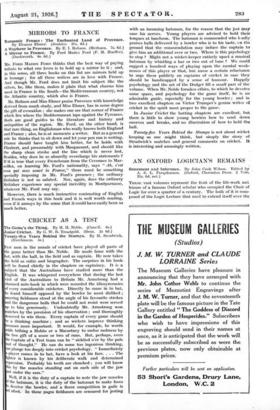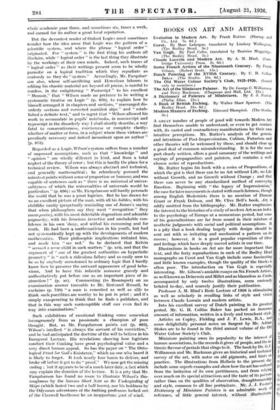AN OXFORD LOGICIAN'S REMAINS
THESE vast volumes represent the fruit of the life-work anti leisure of a famous Oxford scholar who occupied the Chair of Logic for over a quarter of a century. The bulk of it is com- posed of the Logic Lecture that used to extend itself over the whole academic year three, and sometimes six, times a week; and earned for its author a great local reputation.
But the devoutest reader of Oxford Logics must sometimes tvonder how the idea arose that Logic was the pattern of a ficientific system, and where the phrase . "logical order" Originated. For " system " is the first thing his authors all hiselaim, while" logical order" is the last thing they illustrate by the workings of their own minds. Indeed, such traces of " logical order" as their writings present seem to be wholly parasitic on a logical tradition which they repudiate as zealously as they do "system." Accordingly, Mr. Farquhar- son also, whose self-sacrificing and Herculean labours in editing his chaotic material are beyond all praise, is careful to Confess, in the enlightening " Postscript" to his excellent "Memoir," that "Wilson made no pretence to be writing a systematic treatise on Logic" (p. 870), to explain how he himself arranged it in chapters and sections, "rearranged dis- orderly sections and corrected manifest slips" and "estab- lished a definite text," and to regret that "Wilson allowed his work to accumulate in pupils' notebooks, in manuscript and typescript in the disorderly way I shall shortly describe, a way fatal to consecutiveness, conciseness or complete clarity, whether of matter or form, in a subject where these virtues are peculiarly necessary and indeed incumbent upon an author" (p. 873).
Regarded as a Logic, Wilson's system suffers from a number of unproved assumptions, such as that " knowledge " and " opinion " are wholly different in kind, and from a total neglect of the theory of error ; but this is hardly the place for a technical review. Wilson was always abstract and technical, and generally mathematical ; he relentlessly pursued the minutest points without sense of proportion or humour, and was capable of sentences such as "there is no universal of univer- salityness of which the universalities of universals would be particulars" (p. 096) : so Mr. Farquharson will hardly persuade the world that he was a great logician. But he has drawn for us an excellent picture of the man, with all his foibles, with his childlike vanity (perpetually reminding one of James's saying that when philosophers say they want " recognition " they mean praise), with his most delectable dogmatism and adorable pugnacity, with his ferocious invective and unshakable con- fidence in his own 'doxy, and withal his consuming zeal for truth. He had been a mathematician in his youth, but had not systematically kept up with the developments of modern mathematics. Their philosophic implications irritated him, and made him "see red." So he declared that Kelvin "seemed a mere child in such matters" (p. xci), and that the argument of " one of the greatest authorities on hyperbolic geomety " is "such a ridiculous fallacy and so easily seen to be so by anybody accustomed to ordinary logic that I hardly know how to preserve the outward appearance of good beha- viour. And to have this infantile nonsense gravely -and authoritatively put before one as an important piece of in- struction ! " (p. xc). Commenting (to Bosanquet) on an examination answer traceable to Mr. Bertrand Russell, he exclaims (p. 739) "a man is conceited as well as silly to think such puerilitics are worthy to be put in print ; and it's simply exasperating to think that he finds a publisher, and that in this way such contemptible stuff can even find its way into examinations."
- Such exhibitions of emotional thinking come somewhat incongruously from • so passionate a champion of pure thought. But, as Mr. Farquharson points out (p. 683), Wilson's intellect " iS always the servant of his conviction," and he had anticipated the doctrine of the will to believe in his Inaugural Lecture. His revelations showing how logicians conduct their thinking have great psychological value and a very direct human appeal. So has the paper on "The Onto- logical Proof for God's Existence," which no one who heard it is likely to forget. It took nearly four hours to deliver, and broke off before it got to its" proof." We now get the missing ending ; but it appears to be of a much later date, a fact which nay explain the duration of the lecture. It is a pity that Mr. Farquharson has found no room to 'illustrate Wilson's tho- roughness -by the famous Short Note on the Undergirding of Ship. (which lasted two and a half hours), nor his boldness by the *Odyssean adventures of the bathing professors locked out a the Cherwell boathouse by an inopportune gust of wind.



































 Previous page
Previous page